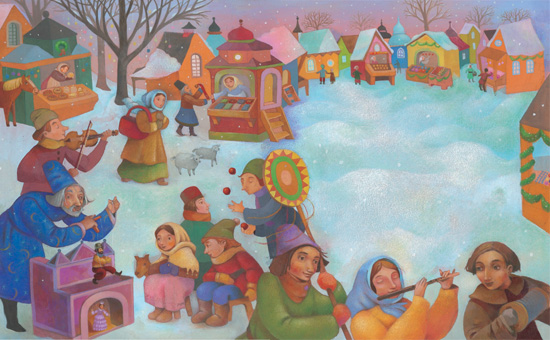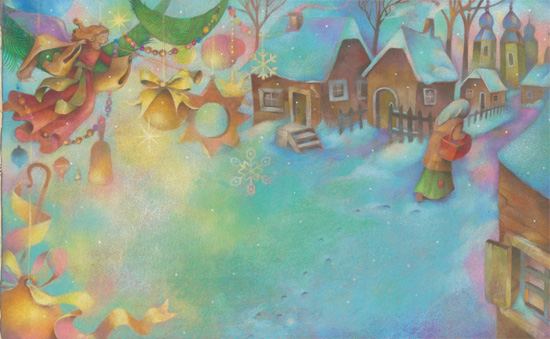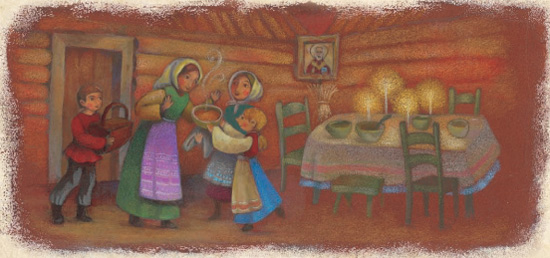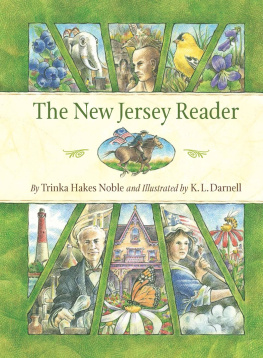Authors Note
One of my fondest Michigan childhood memories is trudging through deep snow into the woods with my brothers and sisters each December to find the perfect tree for Christmas. It had to be a red cedar because my mother loved how it filled our little farmhouse with its rich scent. It was a good thing my father was a patient man because it took us some time to find a tree that was just right. And when we did, we instinctively formed a circle around it while my father cut it down. Sometimes there would be a small birds nest in our tree which we always left as part of our decorations. And once, much to our delight, a couple of moths hatched out.
So, when I first heard of this old Ukrainian tale, it made perfect sense to me that a spider could be carried into a warm house on a freshly cut tree and begin to spin. Further research uncovered a very special spider called the nursery spider that actually spins other things besides webs, like warm little pockets for her spiderlings. Although there are several versions of this old tale, my country childhood inspired me to spin and weave my own story.
A Christmas Spiders Miracle
By Trinka Hakes Noble
Illustrated by Stephen Costanza
For Ruby and Ivy
With my love,
T.H.N.

For Sue and Mike with love,
S.C.
A Christmas Spiders Miracle
Long ago in a faraway place there lived two mothers. One, a humble peasant woman who struggled daily to provide for her children. And the other, a mother spider who also worked hard to care for her family. And although they may appear as different as night and day, these two mothers had more in common than would first seem.
One bitterly cold, bleak Christmas Eve their two lives and stories intertwine like gossamer threads stitching together a quilt.
As the only holiday gift she can give her children, the peasant woman goes to the forest to get a small tree, never noticing that someone has made a home among its branches. During the night the mother spider repays the gift of shelter, resulting in a Christmas celebration that neither mother will ever forget.
Based on an old Ukrainian story, acclaimed writer Trinka Hakes Noble (The Scarlet Stockings Spy and The Orange Shoes) crafts an entirely original and heartwarming tale of kindness, compassion, and the grace that can be found in the true spirit of Christmas.
Lush artwork from artist Stephen Costanza lends an Old World feeling and brings the holiday story to life.
Long ago, in the land of old Ukraine, there once was a winter so bleak and so cold that the peasant folk feared it might never end. The little villages and farms shivered under a frozen mantle of deep snow. The pale sun made little difference as the cold nights grew longer and longer.
Folks could barely wait until Christmas Eve, that long cold night when everyone would light candles to fill the darkness with hope. Oh how theyd feast and dance and make such merriment to celebrate the coming of Christmas, for it was only then that the sun would return to lengthen and warm the coming days.

At the edge of the forest, in this bleakest of winters, there lived a mother spider who knew nothing of Christmas. She had set up housekeeping with her children in a small fir tree, for she did not think it safe to live in a house.
People did not take kindly to spiders, though she did not understand why. Spiders rid houses of pests, like flies and moths. But, alas, that was the way of things, so mother spider did her best to weave her webs and feed her children.

Soon it was the day before Christmas and, as the dark afternoon waned into dusk, promising an even colder night, mother spider became worried. With great care, she spun warm little pockets for each tiny spider and tucked them in.
Now sleep, my little ones, she whispered. Ill keep watch over you.
But, as mother spider wrapped her eight slender legs around her children, she feared she might not survive this long night. Soon the piercing cold overtook her and she descended into a deep, silent sleep.


Nearby, in a tumbledown cottage, there lived another mother and her children. The poor peasant woman earned what she could by mending and darning other peoples clothes, but there never was anything left over, certainly nothing for Christmas. Now Christmas Eve was almost here.

At dusk the Christmas Market was crowded with shoppers as the poor mother crossed the village square to deliver her mending. Festive stalls were overflowing with Christmas wares.
Brightly colored toys and twinkling trinkets filled one. Warm woolly mittens and snug embroidered scarves hung in another. Spiced cakes, braided breads, and honeyed goods were stacked high. Shiny decorations and sparkling tree ornaments were everywhere.
Musicians played, acrobats tumbled, puppeteers performed, and jugglers juggled while the waxy glow of candles warmed the bitterly cold night.
The crisp pine-scented air made folks giddy. Merrily they hurried and scurried, to and fro, gathering everything for Christmas.

But the poor mother could buy nothing. No gay hair ribbons nor warm woolly mittens. No honeyed things. Not a sprig of greenery nor the smallest toy. Not even the tiniest ornament nor the thinnest strip of tinsel. No, not one little bit of Christmas could she buy for her children.
The only thing she could afford was one spool of thread for mending and a meager soup bone. There was nothing for the woman to do but return home empty handed.

But when the mother opened the door, her children were rosy with excitement.
Come, dear Mother. Seat thyself, they cried, prancing and dancing about her. Then, with great fanfare, the children placed a steaming bowl of watery turnip gruel before their mother, for it was all they had.
The mother clapped her hands with joy Oh, my dear little ones! You remembered! For it was the custom throughout the land for children to bring their parents a dish of food as a treat on Christmas Eve.
She closed her eyes, breathed in the wispy vapors, and took a small sip. The thin turnip gruel warmed her heart and nourished her soul, for it was made by the little hands of her dear children.

Oh my, this is delicious! the mother exclaimed. You all must taste it. Like hungry baby birds in a nest, each child eagerly waited as the mother spooned the gruel into their bowls.


















